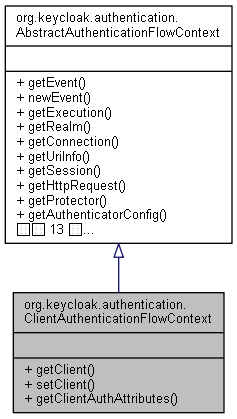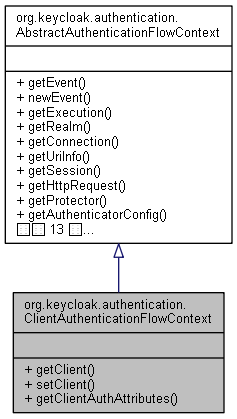Encapsulates information about the execution in ClientAuthenticationFlow
- 著者
- Marek Posolda
◆ attempted()
| void org.keycloak.authentication.AbstractAuthenticationFlowContext.attempted |
( |
| ) |
|
|
inherited |
There was no failure or challenge. The authenticator was attempted, but not fulfilled. If the current execution requirement is alternative or optional, then this status is ignored by the flow.
◆ challenge()
| void org.keycloak.authentication.AbstractAuthenticationFlowContext.challenge |
( |
Response |
challenge | ) |
|
|
inherited |
Sends a challenge response back to the HTTP client. If the current execution requirement is optional, this response will not be sent. If the current execution requirement is alternative, then this challenge will be sent if no other alternative execution was successful.
- 引数
-
◆ failure() [1/2]
Aborts the current flow
- 引数
-
◆ failure() [2/2]
| void org.keycloak.authentication.AbstractAuthenticationFlowContext.failure |
( |
AuthenticationFlowError |
error, |
|
|
Response |
response |
|
) |
| |
|
inherited |
Aborts the current flow.
- 引数
-
| error | |
| response | Response that will be sent back to HTTP client |
◆ failureChallenge()
| void org.keycloak.authentication.AbstractAuthenticationFlowContext.failureChallenge |
( |
AuthenticationFlowError |
error, |
|
|
Response |
challenge |
|
) |
| |
|
inherited |
Same behavior as forceChallenge(), but the error count in brute force attack detection will be incremented. For example, if a user enters in a bad password, the user is directed to try again, but Keycloak will keep track of how many failures have happened.
- 引数
-
◆ forceChallenge()
| void org.keycloak.authentication.AbstractAuthenticationFlowContext.forceChallenge |
( |
Response |
challenge | ) |
|
|
inherited |
Sends the challenge back to the HTTP client irregardless of the current executionr requirement
- 引数
-
◆ generateAccessCode()
| String org.keycloak.authentication.AbstractAuthenticationFlowContext.generateAccessCode |
( |
| ) |
|
|
inherited |
Generates access code and updates clientsession timestamp Access codes must be included in form action callbacks as a query parameter.
- 戻り値
◆ getAuthenticatorConfig()
| AuthenticatorConfigModel org.keycloak.authentication.AbstractAuthenticationFlowContext.getAuthenticatorConfig |
( |
| ) |
|
|
inherited |
Get any configuration associated with the current execution
- 戻り値
◆ getCategoryRequirementFromCurrentFlow()
| AuthenticationExecutionModel.Requirement org.keycloak.authentication.AbstractAuthenticationFlowContext.getCategoryRequirementFromCurrentFlow |
( |
String |
authenticatorCategory | ) |
|
|
inherited |
◆ getClient()
| ClientModel org.keycloak.authentication.ClientAuthenticationFlowContext.getClient |
( |
| ) |
|
Current client attached to this flow. It can return null if no client has been identified yet
- 戻り値
◆ getClientAuthAttributes()
| Map<String, String> org.keycloak.authentication.ClientAuthenticationFlowContext.getClientAuthAttributes |
( |
| ) |
|
Return the map where the authenticators can put some additional state related to authenticated client and the context how was client authenticated (ie. attributes from client certificate etc). Map is writable, so you can add/remove items from it as needed.
After successful authentication will be those state data put into UserSession notes. This allows you to configure UserSessionNote protocol mapper for your client, which will allow to map those state data into the access token available in the application
- 戻り値
◆ getConnection()
| ClientConnection org.keycloak.authentication.AbstractAuthenticationFlowContext.getConnection |
( |
| ) |
|
|
inherited |
Information about the IP address from the connecting HTTP client.
- 戻り値
◆ getError()
Get the error condition of a failed execution.
- 戻り値
- may return null if there was no error
◆ getEvent()
| EventBuilder org.keycloak.authentication.AbstractAuthenticationFlowContext.getEvent |
( |
| ) |
|
|
inherited |
Current event builder being used
- 戻り値
◆ getExecution()
| AuthenticationExecutionModel org.keycloak.authentication.AbstractAuthenticationFlowContext.getExecution |
( |
| ) |
|
|
inherited |
The current execution in the flow
- 戻り値
◆ getForwardedErrorMessage()
| FormMessage org.keycloak.authentication.AbstractAuthenticationFlowContext.getForwardedErrorMessage |
( |
| ) |
|
|
inherited |
This could be an error message forwarded from another authenticator that is restarting or continuing the flo. For example the brokering API sends this when the broker failed authentication and we want to continue authentication locally. forwardedErrorMessage can then be displayed by whatever form is challenging.
◆ getForwardedSuccessMessage()
| FormMessage org.keycloak.authentication.AbstractAuthenticationFlowContext.getForwardedSuccessMessage |
( |
| ) |
|
|
inherited |
This could be an success message forwarded from another authenticator that is restarting or continuing the flow. For example a reset password sends an email, then resets the flow with a success message. forwardedSuccessMessage can then be displayed by whatever form is challenging.
◆ getHttpRequest()
| HttpRequest org.keycloak.authentication.AbstractAuthenticationFlowContext.getHttpRequest |
( |
| ) |
|
|
inherited |
◆ getProtector()
| BruteForceProtector org.keycloak.authentication.AbstractAuthenticationFlowContext.getProtector |
( |
| ) |
|
|
inherited |
◆ getRealm()
| RealmModel org.keycloak.authentication.AbstractAuthenticationFlowContext.getRealm |
( |
| ) |
|
|
inherited |
◆ getSession()
| KeycloakSession org.keycloak.authentication.AbstractAuthenticationFlowContext.getSession |
( |
| ) |
|
|
inherited |
◆ getStatus()
| FlowStatus org.keycloak.authentication.AbstractAuthenticationFlowContext.getStatus |
( |
| ) |
|
|
inherited |
Get the current status of the current execution.
- 戻り値
- may return null if not set yet.
◆ getUriInfo()
| UriInfo org.keycloak.authentication.AbstractAuthenticationFlowContext.getUriInfo |
( |
| ) |
|
|
inherited |
UriInfo of the current request
- 戻り値
◆ newEvent()
| EventBuilder org.keycloak.authentication.AbstractAuthenticationFlowContext.newEvent |
( |
| ) |
|
|
inherited |
Create a refresh new EventBuilder to use within this context
- 戻り値
◆ setClient()
| void org.keycloak.authentication.ClientAuthenticationFlowContext.setClient |
( |
ClientModel |
client | ) |
|
Attach a specific client to this flow.
- 引数
-
◆ success()
| void org.keycloak.authentication.AbstractAuthenticationFlowContext.success |
( |
| ) |
|
|
inherited |
Mark the current execution as successful. The flow will then continue
このインタフェース詳解は次のファイルから抽出されました:


 1.8.13
1.8.13